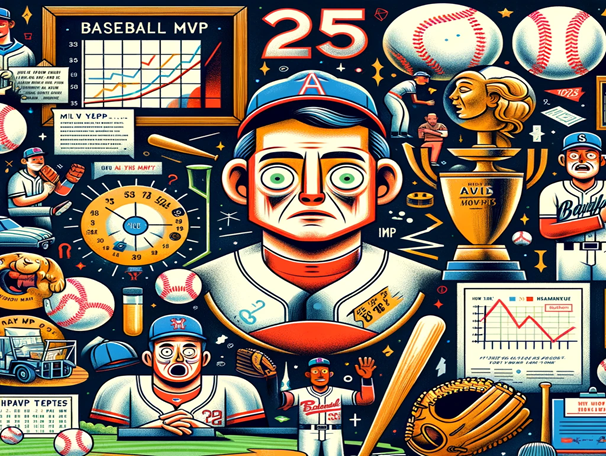MVP Rewind: A Whirlwind Analysis

Welcome to the MVP deep-dive. A wild ride through the good and downright baffling MVP choices of the last 25 years. I’m going to touch on some of the history I find most interesting and some of the metrics we’ll judge them by. Let’s first talk about the stat leading the way for us: WAR.
What is WAR?
To the uninitiated WAR stands for wins above replacement. A stat designed to say how many more wins a player can bring a team in comparison to an average minor leaguer. It’s become a go to stat to assess a player’s total value. Don’t ask how it’s calculated. No one knows but in WAR we trust.
- 0 to 2 WAR: A player in this range is often considered a role player or a bench player. They contribute, but they aren't the stars of the team.
- 2 to 5 WAR: Players within this range are typically solid starters or above-average players. They are valuable assets to their teams and often play a key role in their success.
- 5 to 8 WAR: This is where you find the All-Star level players. A WAR in this range indicates a high level of skill and impact, making these players among the best in the league.
- Above 8 WAR: Achieving a WAR above 8 is often seen as MVP-caliber performance. These players are not just stars; they are superstars and are often pivotal in their team's success, often dominating in multiple aspects of the game.



Stats
In these stats a zero in the playoffs or Championship means their team did not reach that achievement. Additionally, the winning percentages are for the team’s entire season, not just the games they played. These WAR values were pulled from Fangraphs.com and Team performances were pulled from Mlb.com
Team Impact
To my surprise only 8% of MVP’S go on to win the championship despite 76% of the teams making the playoffs. I would attribute this mostly to how important a well-rounded team is in baseball. The impact of an MVP in baseball can be strategically minimized in ways not as feasible in other sports.
Unlike basketball, where a star like LeBron can almost always get the ball, baseball allows teams to intentionally walk or work around the best hitter. These tactics effectively dilute the influence of an MVP in comparison to other major sports. In 2004 Barry Bonds was notably walked in 232 of his 617 plate appearances.
I Know Pain
Five American League teams have missed the playoffs with an MVP over the last 25 years. The Angels are four of those teams. I am an Angels fan and for this sin I have suffered greatly.
Pitching Greatness
Two pitchers have won MVP in recent history, Justin Verlander and Clayton Kershaw. Oddly enough Verlander won MVP for hist 4th best season by WAR. Odd school voters were often blinded by Wins which Justin had 24 of in his 2011 MVP year.
And we will not mention anyone’s playoffs performances. Clayton Kershaw is my leave Britney alone.
Bonds and Steroids
By my count there are 10 MVP’S here who are suspected or known steroid users. Bonds was four of them. Reportedly, Barry Bonds’ head grew so big from taking steroids once that he had to get new hats. He denied it but that doesn’t say much.
Barry Bonds 2001-2004 is the Holy Grail of crazy stats in baseball. You are not a stat nerd unless you look at his numbers once a year. Look them up and get your credentials.
Completely Unwarranted Justin Morneau Shade
Justin Morneau had the lowest WAR (3.8) in a full season for this group. Winning in 2006, Morneau’s offensive stats were great, but his WAR was brought down by his terrible defense at first base. Barry Bonds would have taken approximately 48.5 games to match this WAR with his 2002 season. Honestly, Morneau would miss some all-star teams with this performance.
No, it’s even worse. Justin Morneau playing first base is like using your bed as a shovel. Justin Morneau winning MVP is like saying your dream car is a scooter. Justin Morneau winning MVP is like dressing up as Joker for Halloween, but you get face paint in your eyes. Blinded! Which is apparently how he played first base.
I may have exaggerated slightly but it’s important to me you know how ridiculous this is.
Justin Morneau was not even the best player on his team with 3.8 WAR. That was Johan Santana who led the league with a 6.7 WAR. Johan somehow placed 7th in MVP voting because humans didn’t invent logic until 2009.
That is not where the insanity ends. Justin Morneau was not the best left-handed player on his team, or even the best lefty in the infield. That’s right, Joe Mauer had a 5.8 WAR. So, if you wanted to call Justin Morneau the second-best left-handed infielder on the 2006 Minnesota Twins with the first initial “J” I’d agree with you.
After writing this section I realized Justin Morneau was only paid $385,000 for his 2006 MVP season. I take it all back. He’s the real MVP.
The Year 2000
The 2000 NL MVP voting, and candidates are absurd. The best player is in 5th place. 17th place had an 8.1 WAR. Everyone’s stats are insane. It’s another Justin Morneau sized rabbit hole but I can’t write forever just check it out yourself.
In the A.L. Pedro Martinez had 11.7 WAR in 2000 and got 5th in MVP voting.
The Evolving Philosophy
Over the past 25 years, the philosophy of MVP voting in baseball has seen a significant evolution, reflecting broader shifts in the game's analysis. For most of baseball history, MVP decisions were heavily influenced by traditional statistics like batting averages, home runs, and RBIs, with a preference for players from winning teams.
However, the last two decades ushered in the era of sabermetrics. Essentially, a more complete analytics perspective. The logic behind this shift is largely that batting averages fail to consider all the ways you can get on base, and they treat all base hits equally.
To remedy that problem came OPS (On-base plus slugging). A stat reflecting how much a hitter gets on base and how many bases they get on their hits. This along with stats like WAR and changed how baseball was strategized and discussed.
Today, MVP voting represents a blend of these old and new school analytics.
References
· Image from DALL-E by OpenAI, as of Dec 4, 2023.
· Player WAR values from Fangraphs, checked on Dec 4, 2023. [Fangraphs.com]
· Stats for 2000 NL MVP from Baseball-Reference, viewed on Dec 4, 2023. [2000 Awards Voting | Baseball-Reference.com]
· Justin Morneau’s 2006 salary details from Spotrac. [Justin Morneau Contract Details, Salaries, & Earnings | Spotrac
· Team performance stats from MLB.com.
